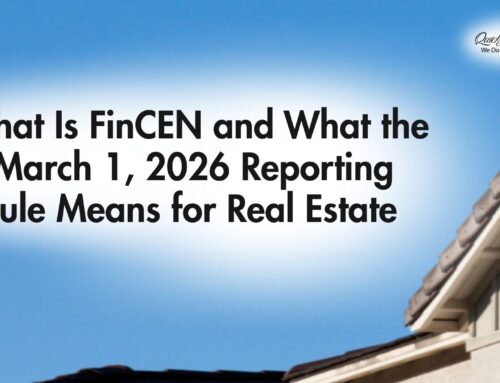August 10, 2025
Home Title Vesting: What You Don’t Know That You Don’t Know
When it comes to Real Estate, it’s often What You Don’t Know That You Don’t Know (WYDKTYDK) that can cost you the most. For example, one of the most overlooked details on a Deed is Vesting.
What is Vesting? Why does it matter so much? Let’s look.
Vesting describes how you hold Title to your property. For example, property can be held individually, jointly, as a married couple, in a Living Trust, or under a business entity like an LLC. It determines who owns what, how ownership is shared, and what happens when someone passes away or if the property is sold or refinanced.
Most people don’t give Vesting a second thought, until it’s too late.
Why Marital Status Matters in Real Estate
In Nevada and many other states, marital status is not just a box to check. It directly affects how property is owned and what happens in the event of divorce, death, or sale.
Here are some common Vesting options:
- Joint Tenants / Joint Tenants with Right of Survivorship (JTWROS): (Video part in BOLD) Ownership is shared equally among two or more people, whether they’re married or not. Each owner has 100% undivided interest in the property. Upon the death of one of the joint tenants, the property passes to the surviving joint tenant(s); it does NOT go through probate, and it CANNOT be willed to an heir. (This would be written ON the video to read. It’s not read. People can hit pause). Do this for each bullet.
- Community Property (For Married Couples Only): All real property acquired during the marriage is considered community property unless designated otherwise. In case of death, the property DOES go through probate, and CAN be willed to an heir.)
- Community Property with Right of Survivorship (CPWROS) (For Married Couples Only): It carries the benefit of survivorship in that it does NOT go through probate in the event of death. It CANNOT be willed to an heir.
- Trusts and LLCs: Even when property is vested in a trust or business entity, the marital status of the owners must be declared correctly to avoid challenges down the road.
- Sole and Separate Property: In Nevada, a community property state, the interest of a spouse who is not on Title must be addressed. Real property cannot be sold or encumbered without the consent and signature of the spouse. To establish the property as one spouse’s sole and separate property, the other spouse must execute a Deed relinquishing any potential community property interest during the marriage. Property held in this manner can be transferred and will require probate upon the owner’s death.
- Tenants In Common: This is usually used by persons buying property together who are not married. The individual interest of the person taking the Title must be stated (i.e., 50% – 50%, ⅓ – ⅓ – ⅓, etc). The ownership interest CAN be sold or willed. In the case of death, it DOES require probate.
What Happens if Vesting Is Incorrect or Omitted?
Errors in Vesting can create expensive and time-consuming problems:
- Probate Exposure: If survivorship rights aren’t clearly spelled out, property will end up in probate, even if your intentions were otherwise. (Eric- same method here)
- Unclear Ownership: Title disputes can arise when Vesting doesn’t match the owners’ intent.
- Financing Issues: Lenders often require specific Vesting to fund loans. An incorrect Vesting can delay or even derail a closing.
- Divorce Complications: If marital status is not correctly reflected, dividing property during divorce can become combative and expensive.
In short, incorrect or missing Vesting is a ticking time bomb. One wrong detail will trigger legal problems, paralyze transactions, and drain your emotion, time, and assets.
Transfer Property Correctly The First Time
When transferring property, whether you are adding or removing a spouse, creating a trust, or setting up an LLC, Vesting is not a minor detail. It is the foundation of your property rights.
At Quick Claim USA, we specialize in ensuring Vesting is done right. Our documents are created to Title industry standards, making sure your ownership reflects your real intentions and protects your family’s future.
When it comes to your home or investment property, the last thing you want is to discover, too late, that you misunderstood Vesting.
Need clarity on your Vesting? Our expert team has guided over 12,000 families with accuracy, compassion, and concierge-level service. We’ll make sure your paperwork is correct.
The cost of waiting is always higher than the cost of accuracy. One wrong word on your Deed will cost thousands in court.
Let us protect your legacy. Schedule your Vesting review today, before it’s too late.
Your Concierge of Good Deeds
Disclaimer: We are not attorneys, CPAs, or tax advisors in the state of Nevada or any other state. We are not licensed to give legal, tax, or financial advice, nor may we accept fees for doing so. Nothing in this information, digital content, social media channels, profiles, or website is intended to be or should be considered legal, financial, or tax advice. Laws, statutes, tax codes, lending policies, guidelines, programs, and more are subject to change. Social media and website content may not be fully up-to-date. Information is provided “as is” without any guarantees, warranties, or representations, implied or otherwise. Each legal matter is unique and specific. Therefore, QC Deed, LLC, DBA: Quick Claim USA, encourages every individual and business to seek professional guidance from legal counsel and qualified or certified professionals regarding their specific legal, tax, or financial matters.
Subscribe to the newsletter
Get news from Quick Claim USA in your inbox.




